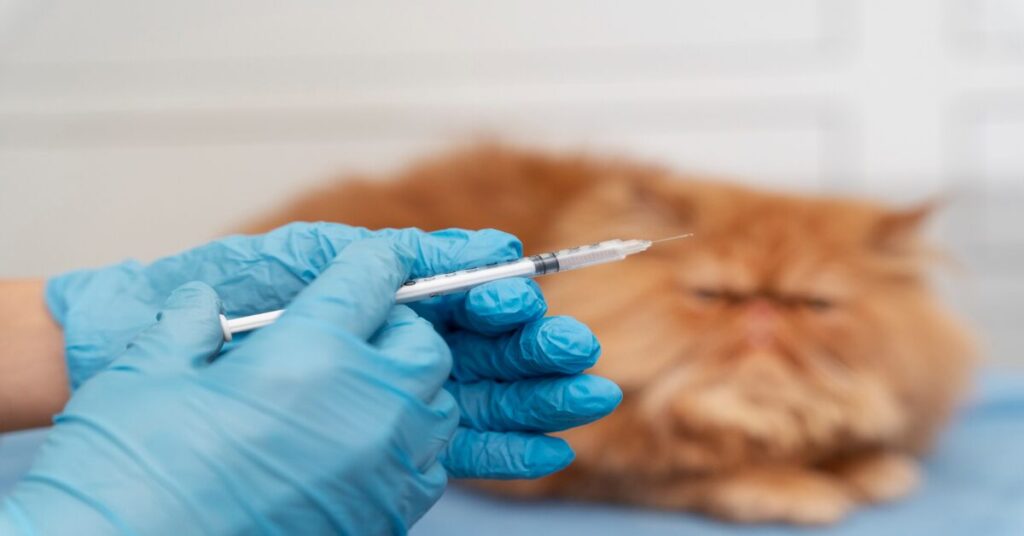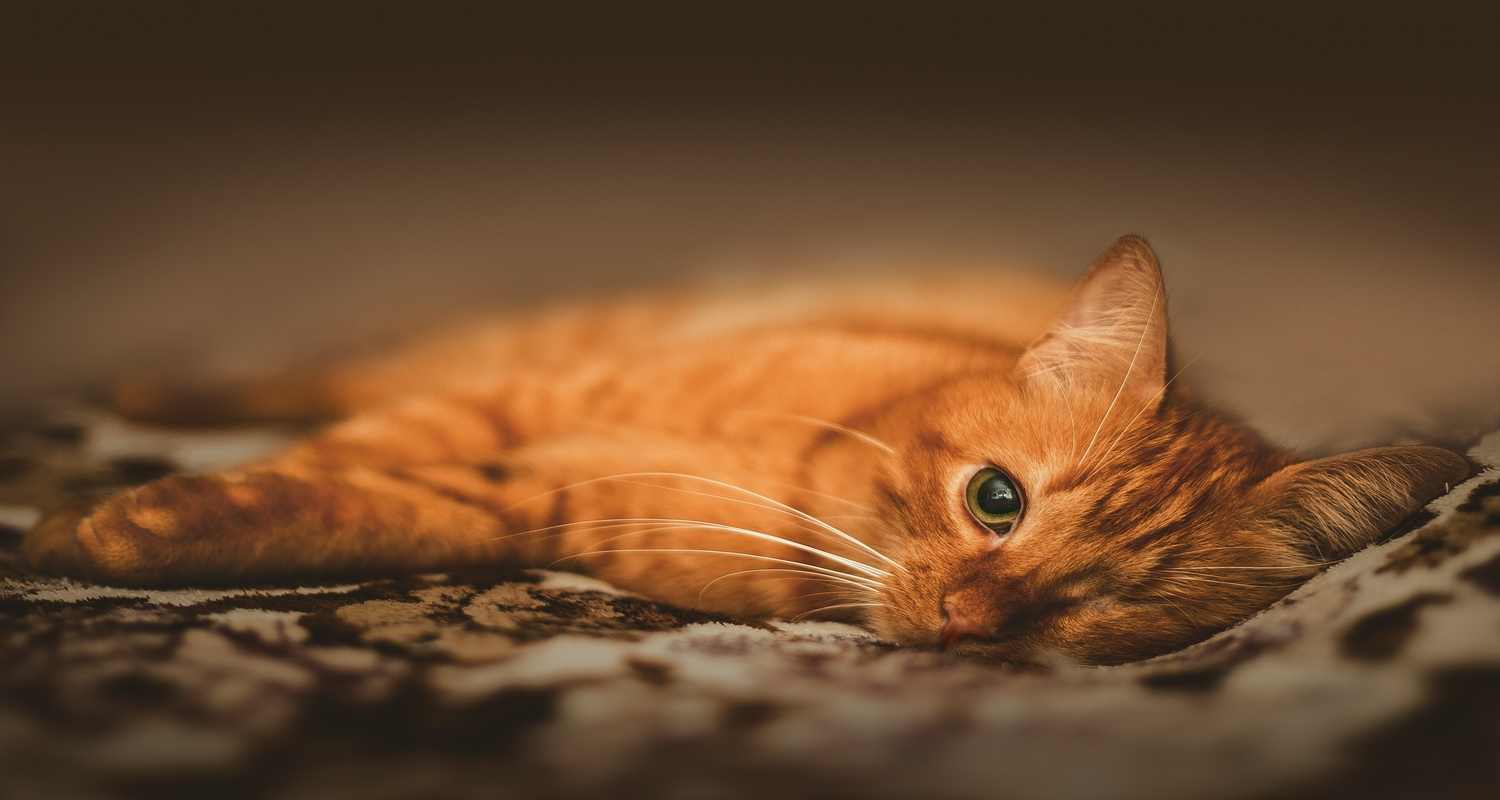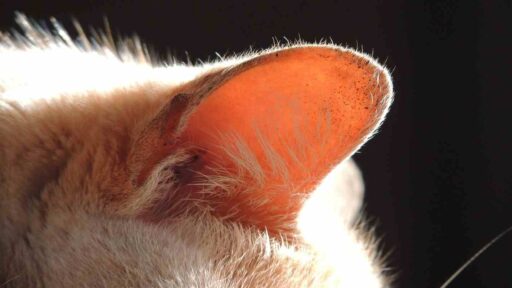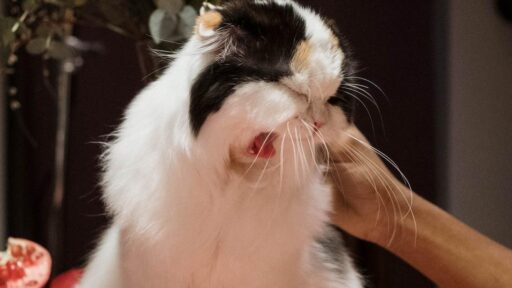why is my cat throwing up? When a cat throws up, it expels the contents of its stomach through its mouth. This can include food, hairballs, bile, or other substances. Vomiting in cats can occur for various reasons, ranging from minor issues like hairballs to more serious health concerns such as infections or gastrointestinal disorders. If your cat is vomiting frequently or experiencing other symptoms, it’s important to consult with a veterinarian for proper evaluation and treatment.
why is my cat throwing up? -Types
the types of vomiting in cats:
- Hairball vomiting: Cats groom themselves by licking their fur, and they often swallow hair in the process. Hairballs can accumulate in the stomach over time, leading to occasional vomiting episodes to expel them. This type of vomiting typically involves the expulsion of cylindrical masses of hair mixed with stomach fluid.
- Regurgitation: Regurgitation differs from vomiting in that it involves the passive expulsion of undigested food or liquid from the esophagus, typically without abdominal effort. It may occur immediately after eating or drinking and can be caused by various factors such as esophageal disorders, swallowing difficulties, or eating too quickly.
- Bilious vomiting: Bilious vomiting occurs when a cat vomits bile, a yellowish-green digestive fluid produced by the liver. This type of vomiting can occur when a cat’s stomach is empty for an extended period, such as overnight or between meals. It may indicate issues like gastritis, gastrointestinal inflammation, or dietary concerns.
- Food-related vomiting: Food-related vomiting can result from dietary indiscretion, such as consuming spoiled food, overeating, or eating too quickly. Cats may vomit shortly after eating or several hours later, depending on the cause.
- Chronic vomiting: Chronic vomiting refers to recurrent or persistent vomiting episodes over time. It can be indicative of underlying health issues such as gastritis, inflammatory bowel disease (IBD), gastrointestinal obstructions, pancreatitis, or organ dysfunction.
- Acute vomiting: Acute vomiting refers to sudden onset vomiting, often with a short duration. It can be triggered by various factors such as dietary indiscretion, infections (viral, bacterial, parasitic), ingestion of toxic substances (plants, chemicals), or sudden changes in diet or environment.
Understanding the specific type of vomiting your cat is experiencing, along with accompanying symptoms and frequency, can help your veterinarian diagnose the underlying cause and develop an appropriate treatment plan.
why is my cat throwing up? -Causes
here are some common causes of vomiting in cats:
- Hairballs: Cats ingest loose hair while grooming, which can accumulate in the stomach and lead to vomiting.
- Dietary indiscretion: Eating too quickly, consuming spoiled food, or overeating can cause vomiting.
- Allergies: Food allergies or intolerances can result in vomiting.
- Infections: Viral, bacterial, or parasitic infections affecting the gastrointestinal tract can lead to vomiting.
- Gastrointestinal disorders: Conditions such as gastritis, inflammatory bowel disease (IBD), or pancreatitis can cause vomiting.
- Foreign objects: Ingesting non-food items like string, toys, or plants can lead to vomiting if they become stuck in the digestive tract.
- Toxins: Ingesting toxic substances like certain plants, chemicals, or medications can induce vomiting.
- Organ dysfunction: Liver or kidney disease, thyroid imbalances, or other systemic disorders can contribute to vomiting.
- Stress or anxiety: Cats may vomit in response to stressful situations or changes in their environment.
If your cat is vomiting persistently, has other concerning symptoms, or if the vomiting is accompanied by lethargy or loss of appetite, it’s important to seek veterinary care for proper evaluation and treatment.
Diagnosing the cause of throwing up in a cat
Diagnosing the cause of vomiting in cats typically involves a combination of the following steps:
- Physical examination: A veterinarian will conduct a thorough physical examination of the cat to assess overall health and identify any visible signs of illness.
- Medical history: The veterinarian will gather information about the cat’s medical history, including diet, recent changes in behavior or environment, vaccination status, and any medications or treatments administered.
- Diagnostic tests: Depending on the suspected underlying cause, diagnostic tests may be recommended. These can include blood tests, urinalysis, fecal examination for parasites, imaging studies (such as X-rays or ultrasound), or endoscopy to visualize the gastrointestinal tract.
- Dietary trial: If food-related allergies or intolerances are suspected, a dietary trial may be conducted to identify and eliminate potential triggers from the cat’s diet.
- Elimination diet: An elimination diet may be recommended to rule out food allergies or intolerances by gradually reintroducing specific ingredients to identify triggers.
- Treatment trials: In some cases, empirical treatment may be initiated based on the suspected cause of vomiting. This can include medications to address gastrointestinal inflammation, deworming treatments for parasitic infections, or dietary modifications.
- Monitoring response: After implementing diagnostic tests or treatment trials, the cat’s response is closely monitored to assess improvement or identify the need for further investigation or adjustments to the treatment plan.
why is my cat throwing up? -Veterinary examination
A veterinary examination is a crucial step in diagnosing the cause of vomiting in cats. During this process, a veterinarian will:
- Conduct a physical examination: This involves assessing the cat’s overall health, checking for any abnormalities or signs of illness, and palpating the abdomen to detect any discomfort or abnormalities.
- Review medical history: The veterinarian will inquire about the cat’s medical history, including previous illnesses, vaccinations, medications, and any recent changes in behavior or environment that may be relevant to the vomiting.
- Perform diagnostic tests: Depending on the suspected cause of vomiting, diagnostic tests may be recommended. These can include blood tests, urinalysis, fecal examination for parasites, imaging studies (such as X-rays or ultrasound), or endoscopy to visualize the gastrointestinal tract.
- Discuss dietary habits: The veterinarian may inquire about the cat’s diet, including the type of food being fed, feeding schedule, any recent changes in diet, and whether the cat has access to potential toxins or hazardous materials.
- Assess hydration status: Dehydration is a common concern in vomiting cats, so the veterinarian will assess the cat’s hydration status and administer fluids if necessary.
- Provide treatment: Based on the findings of the examination and diagnostic tests, the veterinarian will develop a treatment plan tailored to address the underlying cause of vomiting. This may include medications, dietary changes, fluid therapy, or other interventions as needed.

why is my cat throwing up? -Treatments
Treatment for vomiting in cats depends on the underlying cause and may include:
- Dietary changes: Switching to a hypoallergenic or easily digestible diet can help manage food allergies or sensitivities. Feeding smaller, more frequent meals may also prevent vomiting in cats prone to eating too quickly.
- Medications: Antiemetic medications may be prescribed to control vomiting and nausea. Probiotics or medications to reduce stomach acid production can also be beneficial in certain cases.
- Fluid therapy: Intravenous or subcutaneous fluids may be administered to rehydrate cats that are dehydrated due to vomiting. Electrolyte supplementation may also be necessary in severe cases.
- Treatment for underlying conditions: If vomiting is secondary to an underlying medical condition such as inflammatory bowel disease, pancreatitis, or liver disease, specific treatments targeting these conditions may be recommended.
- Parasite control: Deworming medications or treatments for internal parasites may be necessary if parasitic infections are identified as the cause of vomiting.
- Surgery: In cases where vomiting is caused by gastrointestinal obstructions, foreign bodies, or other structural abnormalities, surgical intervention may be necessary to remove the obstruction or repair the affected area.
- Environmental management: Minimizing stressors in the cat’s environment and providing a calm, stable home environment can help reduce anxiety-induced vomiting in some cases.
- Home care: Depending on the underlying cause of vomiting, home care measures such as feeding a bland diet, providing plenty of fresh water, and monitoring for changes in behavior or symptoms may be recommended.
It’s essential to consult with a veterinarian to determine the appropriate treatment for your cat’s specific situation. Never administer medications to your cat without veterinary guidance
Why is my cat throwing up? FaQs
When should I be concerned about my cat throwing up?
You should be concerned about your cat throwing up if it becomes frequent, projectile, or contains blood. Additionally, if your cat shows other concerning symptoms like lethargy, diarrhea, or loss of appetite, it’s best to seek veterinary care promptly for proper evaluation and treatment.
What does concerning cat vomit look like?
Cat vomit may exhibit the following characteristics:
- Frequency: If your cat is vomiting frequently, such as multiple times in a day or over several days, it could indicate an underlying issue.
- Projectile vomiting: Vomiting with forceful expulsion of stomach contents is concerning and may indicate an obstruction or serious gastrointestinal problem.
- Blood: Vomit that contains blood, either fresh or digested, can signal various health issues, including gastrointestinal bleeding or irritation.
- Foamy or frothy vomit: This type of vomit may suggest stomach irritation or the presence of mucus, which can indicate underlying problems.
- Undigested food: If your cat is consistently vomiting undigested food shortly after eating, it may indicate issues with digestion or gastrointestinal motility.
- Abnormal odor or appearance: Vomit that smells foul or appears abnormal in color or consistency may indicate the presence of toxins, foreign objects, or underlying health problems.
What can I give my cat for vomiting?
If your cat is vomiting, try these steps:
- Give no food for 12-24 hours.
- Offer bland food after fasting.
- Let your cat eat grass.
- Watch for worsening symptoms.
- If vomiting continues, see a vet.
Why is my cat vomiting but acting normal?
If your cat is vomiting but acting normally otherwise, it could be due to various reasons such as eating too quickly, hairballs or minor stomach upset. Keep an eye on your cat for any changes in behavior or frequency of vomiting. If it persists or worsens, consult a vet for further evaluation.




